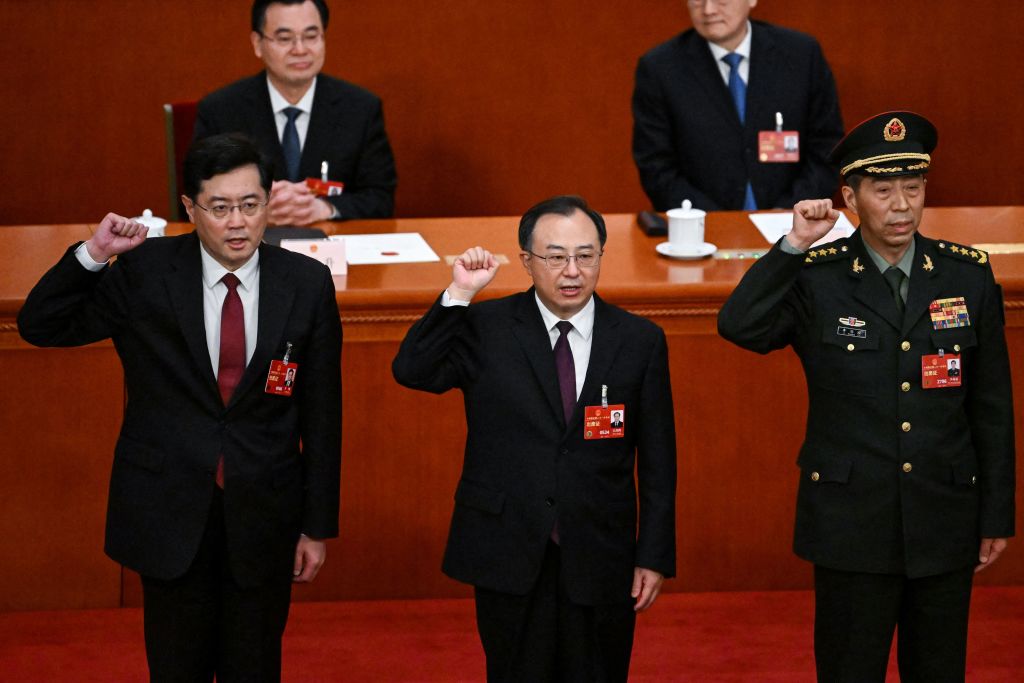Two down and who knows how many more to go. This week, Defence Minister Li Shangfu became the latest of China’s top leaders to vanish, reportedly caught up in a corruption scandal. He has not been seen for three weeks and his disappearance comes three months after that of foreign minister, Qin Gang, and follows a purge at the top of China’s Rocket Force, which oversees its rapidly expanding nuclear arsenal. Li lasted just six months in the job, having been appointed in March. At a security forum in Beijing late last month, one of his last public appearances, Li said the world was entering a period of ‘instability’ – though that term would seem to apply more aptly to the top echelons of the Chinese Communist party.
Reuters reports that the investigation into Li relates to the period 2017 to 2022, when he was head of the People Liberation Army’s equipment procurement unit, a notoriously corrupt part of the military. Eight other senior officials are also being investigated, according to the news agency, which cited ten sources. Li, who was sanctioned by the US in 2018 over China’s purchase of Russian weapons, has missed a series of diplomatic engagements. Rahm Emanuel, the US ambassador to Japan, likened President Xi Jinping’s cabinet to the Agatha Christie novel And Then There Were None.
Li’s disappearance comes as more information begins to seep out about China’s missing foreign minister. An internal foreign ministry investigation reportedly found that Qin Gang was dismissed because of ‘lifestyle issues’ – specifically having engaged in an extramarital affair that led to the birth of a child. What makes this so intriguing – and so sensitive for China – is that the affair took place while Qin was ambassador to the US, from July 2021 to January this year, when he became foreign minister. The baby was born in America, and will therefore be eligible for a US passport.
The reports did not name the woman, but Qin has previously been linked to Fu Xiaotian, a high-profile Cambridge-educated Chinese television personality. Shortly before Qin disappeared, Fu tweeted from what appeared to be a private jet parked up in Los Angeles, sharing three photographs: the aircraft, an image from an interview she’d conducted with Qin, and a selfie of her cradling her baby. That tantalising post was her last before she too seemingly vanished. The latest revelations, and suggestions that Qin and his mistress maintained an apartment close to the ambassador’s residence in Washington DC, have inevitably fuelled speculation that the foreign minister was compromised in some way – that his mistress might have been a double agent, or at the very least his nocturnal activities were closely monitored by the FBI. Given the acute level of paranoia within the CCP, there will almost certainly be a witch-hunt underway to find out who at the embassy might have abetted the ambassador’s extra-curricular activities. Qin also spent more than a decade in the UK – as a diplomat from 1995 to 2005, and then briefly as ambassador for a little over a year from 2010. MI5 will no doubt be dusting down their own records.
Both Qin and defence minister Li were appointed by Xi Jinping and were regarded as trusted Xi loyalists, which inevitably raises questions about his judgement. It will inevitably fuel his deep-seated paranoia, and there is little wonder that he has seemed a little preoccupied of late. He skipped the G20 meeting in New Delhi earlier this month, and last month unexpectedly missed a scheduled speech to a key business forum during the BRICS summit in South Africa. This week he sent Vice President Han Zheng to the United Nations General Assembly, and he has yet to confirm his attendance at an APEC leaders meeting in San Francisco in November, where US officials hope to arrange a summit with President Biden.
Japanese news reports have suggested that during the CCP’s annual summer seaside conclave at the coastal town of Beidaihe, Xi was reprimanded by party elders. The gist of the message, according to Nikkei Asia, was that if political, economic and social turmoil continued the CCP could lose support, posing a threat to its rule. ‘We cannot have more turmoil, the elders pointed out,’ according to the report. In truth, the CCP is such an opaque organisation that it is hard to say what goes on behind the closed doors in Beidaihe or the leadership compound in Zhongnanhai, Beijing. These are certainly uncomfortable times for Xi, though it may be beyond even the imagination of Agatha Christie to guess what might come next.







Comments